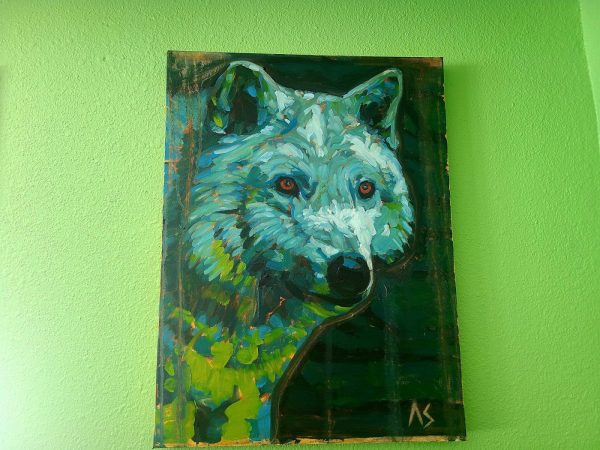How an Albino Direwolf Named Ghost Made Me Think About Being Rare

“A white wolf in a white wood, silent as a shadow.” – “A Dance with Dragons,” George R. R. Martin
I wanted to write something that encompasses the upcoming Rare Disease Day on Feb. 28, and what it means to me. I searched my thoughts to figure out how rare disease might be interwoven into the tapestry of my life. Fandom set in, and I narrowed it down to two things: direwolves and the master sword from the Legend of Zelda. Eventually, I settled on the former.
Ghost, an albino direwolf, is one of my favorite characters in the book and television series “Game of Thrones.” He is different: Not only is he a species thought to be lost to the passage of time, but also he is pure white with scarlet eyes, and unnaturally quiet.
I relate to Ghost in many ways. For one, he is rare. I have Becker muscular dystrophy and am considered rare as well.
Approximately one in 30,000 male newborns are diagnosed with this X chromosome-linked disease. Growing up, I was often quiet and reserved, unsure of how to approach people about my rare disease. It’s been difficult for me to be honest and open about some of my physical challenges with exertion.
My reserved behavior has worked for me until now because I appeared physically capable for most of my younger years. Now that I’m older, my Becker is catching up with me in daily life as I exhibit more physical symptoms, such as difficulty with stairs. These changes have brought about a need to talk more openly about my life.
In the opening scene of “Game of Thrones,” Ghost is the first of the direwolf pups to wander off from a deceased mother, in an attempt to survive. The character of Jon Snow, one of the story’s main protagonists, notices Ghost, and the two create a bond.
It’s important to have these types of bonds in life to combat feelings of isolation that come with rare disease. How many of us feel like we have walked off into the wilderness alone? This feeling is not rare. Thoughts of self-worth and how we fit into the world are complex and natural.
This is the first Rare Disease Day in which I plan to fully acknowledge my Becker muscular dystrophy by telling my story, and I’m doing it through this column. This decision comes from a place of accepting myself and who I am.
By accepting that he was the runt of his litter and white as snow, Ghost’s courage to be himself was enlightening for me: I could relate to his divergent place in the world.
When I have bad day, I’ll look at a painting of Ghost hanging on the wall in my office. His blood-red eyes stare at me, forcing me to look inward. I think about what a brave wolf he is, and I’ll consider taking more courageous paths forward in my life.

Ghost, painted by Alexi Stankowski. (Photo by Andy Rusch)
Even writing this column has taken bravery because I’ve worried what others might think of me. One thing I have struggled with is finding others who share my experience.
In the television series, Ghost runs alongside Jon Snow into many of the conflicts in the series, including the war against the White Walkers, the icy, undead villains of the series. But being brave doesn’t mean we must rush into conflict with abandon. These scenes have stuck with me because it seems that if we have support in life, even victories against “the frozen undead” seem possible. Bravery is about taking the good with the bad, and focusing on the good.
It certainly doesn’t hurt to have a dragon or two on your side when headed into battle, though.
Ghost’s character arc chronicles his survival in a world that saw him as dangerous and unfit for civilized society. But Ghost didn’t survive because he walked his path alone. He survived because he surrounded himself with others who wanted to see him thrive. Jon Snow saw something special in that young wolf and formed a bond with him. This helped Ghost to embrace his rarity.
In my life, I have found people who are like that, too. Because of this, I am suited to triumph in the lands of winter.
***
Note: Muscular Dystrophy News is strictly a news and information website about the disease. It does not provide medical advice, diagnosis or treatment. This content is not intended to be a substitute for professional medical advice, diagnosis, or treatment. Always seek the advice of your physician or another qualified health provider with any questions you may have regarding a medical condition. Never disregard professional medical advice or delay in seeking it because of something you have read on this website. The opinions expressed in this column are not those of Muscular Dystrophy News or its parent company, Bionews, and are intended to spark discussion about issues pertaining to muscular dystrophy.







Leave a comment
Fill in the required fields to post. Your email address will not be published.